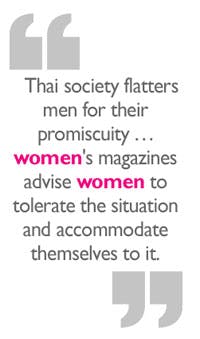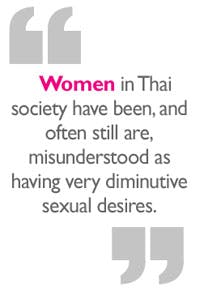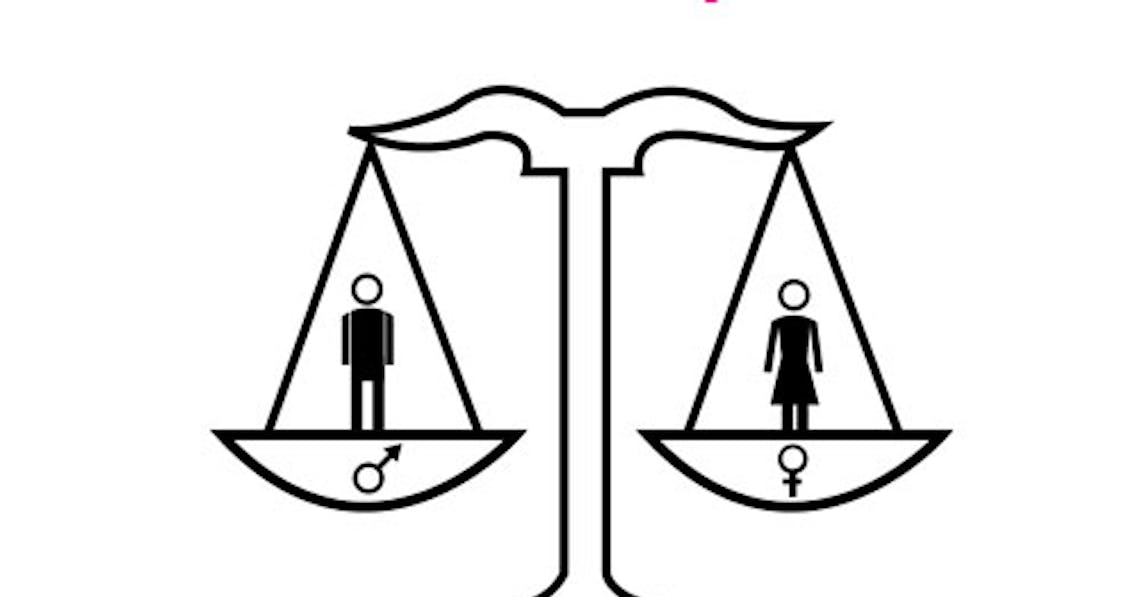As foreigners, it seems the closer we get to the core of Thai society, the more confused we become, our attempt at immersion is often met with failure. There are those who jump right in, exchange vows with virtual strangers, only to realise that they have fallen down a rabbit hole, then there are those who learn the language and try to adapt slowly, but more often than not, in both cases, truly understanding their adopted culture is beyond their ken.

It is in our personal relationships with Thais where we might most feel the chasm between our cultures, beliefs, psychology. It’s not particularly common to see foreign men hanging out with Thai males, the cultural barrier, in most cases, defies fusion. Similarly, what can so often happen in the foreign male/Thai female relationship, once the initial euphoria has waned, is a long lapse into the realms of dysfunction. Relationships between Thais and foreigners are frequently marred, or even annulled, because of the emergence of agendas, expectations, beliefs, dynamics that were previously unrealised.
Notably, in Thailand, where cross cultural relationships are concerned what sometimes confounds the foreign male partner is his lover’s proclivity to distrust, to be suspicious; often foreign men have a difficult time understanding why their lover would be so unflaggingly wary, this cultural idiosyncrasy may seem normal to the Thai perspective but for most foreigners the trust, or the mistrust, issue is debilitating. The jealousy may begin as endearing or affectionate, though oftentimes this can become tiresome or worrying for the recipient… or dangerous. Thailand easily has the highest rate of penicide _ last case in May, the victim a Belgian man – in the world according to various news reports. The question begs to be asked: Why?

A considerable amount of research was conducted in Thailand around the early nineties when the AIDS epidemic was thought to be at its most virulent, much of this research concluded that the exceptionally fast spread of HIV in Thailand was partly due to society’s acceptance of prostitution and male infidelity. The Kinsey Institute (named after Alfred Charles Kinsey, founder of sexology) in their report on Thai sexuality1 found that 90% of the male participants had had sex with a prostitute and 74% had lost their virginity with a female sex worker. Then Prime Minister Anand Panyarachun said in 1991 that 450, 000 Thai men visit prostitutes every day in the kingdom, while the Kinsey Institute adds that “Minor wives and commercial sex are common sexual outlets for men of all ages, social standings, and marital statuses.” In understanding the mistrust of Thai women it’s not only important to look at men’s sexual habits statistically but also recognise how male promiscuity is de rigueur in Thailand. The Kinsey Institute, reported by Sukanya Hantrkul, on highlighting infidelity trenchantly points out, “Thai society flatters men for their promiscuity… women’s magazines advise women to tolerate the situation and accommodate themselves to it.”
In traditional Thai society – though residual in modern society – women are expected to adhere to the codes of kulasatrii (virtuous lady), to be riap roi, (demure and proper), in view of a man’s assertions. Though of course the double standard is glaring when compared with a man’s necessity for prostitution or ‘bits on the side’ – if women can not sleep around then who can the men sleep with if they are to fulfil their carnal prerogative as chaai chatri – macho gentleman? “Men’s sexual desires are often perceived as insatiable, with an immature, uncontrollable character like a child’s craving, that can hardly be limited to their spouses,” reports the Kinsey Institute on the Thai perspective. The origins of these codes of sexual behaviour date back far into Thai history and have an important place in folk tales, religion and rulership, though even in the present day the Thai media, especially in the soaps, holds fast to these antiquated gender roles. In the book Genders and Sexualities in Modern Thailand2, participants were interviewed from varying social backgrounds about infidelity and the use of prostitutes. The book states that “most women consider this behaviour to be normal,” concerning men visiting prostitutes, though this naturally has a knock on effect where trust is concerned. As Thai men and Thai women often socialise with their own sex, Thai women are tolerant of their husbands spending time with their friends; it was stated by some male survey participants that going out with their wives would be pointless. Jackson’s book points out that often the marriage relationship is far from platonic and often the husband and wife live very separate lives, the man’s other life generally features other women. Concerning prostitutes, a Bangkok middle-class woman stated, “We cannot forbid since men think it’s ordinary,” while a male factory worker responded, “It should be ordinary,” in the same survey. Most women in the survey admitted that they would be tolerant of infidelity as long as he provided for her and did not take a second wife. It is also important to realise that in certain societal environments a man’s promiscuity is often seen as the woman’s problem, her failure in making him contented is her failure in marriage. The purist attitude towards gender roles, unsurprisingly – as the tenets were devised by the patriarchs – seems to confer immunity on the men.

Women in Thai society have been, and often still are, misunderstood as having very diminutive sexual desires, while those that do engender such traits are oft maligned. Independent women are usually portrayed in the media as unscrupulous, dangerous and deceitful. A Thai proverb notes that typical Thai women are both manipulative and cunning even while maintaining kulasatrii standards, saying women possess ‘one hundred wagons full of stratagems’. A woman’s place is to please and service a man’s sexual compulsions while abiding by kulasatrii morals. Jackson writes, “Many women believe that men are often unreliable, unable to make emotional commitments, inefficient in household management and are constantly driven by sexual urges.” In comparison women are forbidden to express themselves sexually, to have sexual desires, sexual independence or disclose romantic relationships – the answer to ‘Do you have a boyfriend’ is more often than not met with a negative.

Dr. Sukrittaya Jukping of the Women’s Studies department at Chiang Mai University touched on gender roles in Thai society, explaining that even though Thailand is becoming more a country of sexual equality, in some aspects it resembles its patriarchal past. “You can see in the Thai soaps, the good guy will sometimes rape the main female character, but despite the rape and torture they will end up living happily ever after,” explained the ajarn and emphatically asked, “How can Thai women live with that, what kind of message is this sending to Thai women? To exonerate this man after his use of force, the violation, it’s absolutely absurd to me.” She believes the mass media perpetuate the use of force against Thai women. “If Thai women cheat on their spouse it’s a death sentence for her,” said the ajarn, a statement possibly not meant in the metaphorical sense as it did echo some remarks in Gender and Sexualities in Modern Thailand where male study participants broached female infidelity, “Our society can’t accept this kind of behaviour in women. Two tigers can’t live in the same cage. One must die.” (Note the murders by a cuckolded man who shot and killed his wife, her lover and son in May on Khao Sarn Road, a tourist was also injured). Another respondent answered, “This is forbidden. They can be killed by their husbands… It’s the most serious damage a woman can do to her family.” In every case the male conveyed, and even the female to some extent, that the double standard was the standard. “You have to look at the historical context,” said Sukrittaya,” polygamy was practiced for many years, kings housed many consorts, women were not human back then, they were chattel, male property.” She added that social change is ponderous as infidelity is still taboo and rarely talked about; even data is hard to come by as it’s difficult to obtain truthful answers. “If you want to know more about Thailand and gender roles then you must look to our history, there you will find answers.” She mentioned that having a mia noi, second wife, or a consort was a status symbol for many Thai men. “It has been known for a long time that polygamy is acceptable, women are well aware that her man may have this potential to cheat. The seed is already planted, he may prove he’s trustworthy but he’ll have to work at that.” She emphasised that certain social norms are ingrained in the minds of men and women and these norms are difficult to erase. “Even though we’ve abolished polygamy the residue has been etched into the hearts and minds of the people, even in folkloric tales the male hero is often a philanderer.” One such famous allegorical tale where a woman can not make up her mind between two suitors is beheaded for her indecision. “Women are not allowed this choice, a good Thai woman not have ‘two hearts’.” On a more positive note Sukrittaya held out hope for the future, “Don’t underestimate Thai women, even though it’s hard for them to be open about issues, taboos, inequality, they are fighting and will keep on fighting, they are not just victims of society.”

As for Generation Y, the female youngsters of today, do they still live in this world of fear and intractable distrust? I interviewed some female twenty-somethings. All the participants conveyed that men are guilty until proven innocent, or, cynically, until ‘proof is found’. Some mentioned they remember their grandfather’s consorts _ in one case the consort lived with the family _ adding that their mothers had “no choice” but to allow promiscuity, though they felt that their independence earned them the right not to put up with the same maltreatment. One girl maintained, admitting she did not trust men, “What I don’t see, doesn’t bother me… what’s the point in checking phones?” and she laughed. A slightly older girl said, “I would never trust 100%… maybe 80%,” and admitted she had had bad experiences with men in the past. Mirroring Jackson’s study all the participants agreed women cannot sleep around, though it is natural for men. Many women turned the interview down and most of them were reluctant to discuss sexual matters, though one interviewee was quite open, explaining that its not womanly to talk about sex, women are not meant to have sexual opinions. On changing sexual/gender attitudes in Thailand she grinned wryly and said, “Nothing has changed”. Even though the younger female generation is more empowered, more liberated, it is obvious that an undercurrent of tension still exists between the sexes.
Lying begets suspicion, cheating encourages mistrust, repression can bare oppression, disempowerment sponsors manipulation, and so on, the vicious cycle of embattled love continues. It seems the female lover has had, still has, a lot to contend with, if not the pains of personal experience, then the weeds of archaic societal beliefs, a history of male domination and double standards. For relationships to succeed, to come to real fruition, whether in friendship, love, or politics, Georg Wilhelm Friedrich Hegel recommended ‘mutual recognition’. An active recognition of each other’s freedom, a more pure awareness of another’s identity, where neither entity is ‘master’ nor ‘slave’. Hegel’s idealism would certainly go a long way in improving the male/female relationship dysphoria in Thailand, in fact, everywhere, but in the words of another renowned deep thinker, Al Hoffman, ‘It takes two to tango’.
1. International Encyclopaedia of Sexuality (2004): Thailand by Kittiwut Jod Taywaditep, Ph.D., Eli Coleman, Ph.D., and Pacharin Dumronggittigule, M.Sc.*Updates by K. J. Taywaditep, Ryan Bishop, Ph.D., and Lillian S. Robinson, Ph.D. www.kinseyinstitute.org/ccies/th.php
2. Genders & Sexualities in Modern Thailand by Jackson, Peter A. (Editor), Cook, Nerida (Editor) Publisher: Silkworm Books ISBN: 9747551071 EAN: 9789747551075
